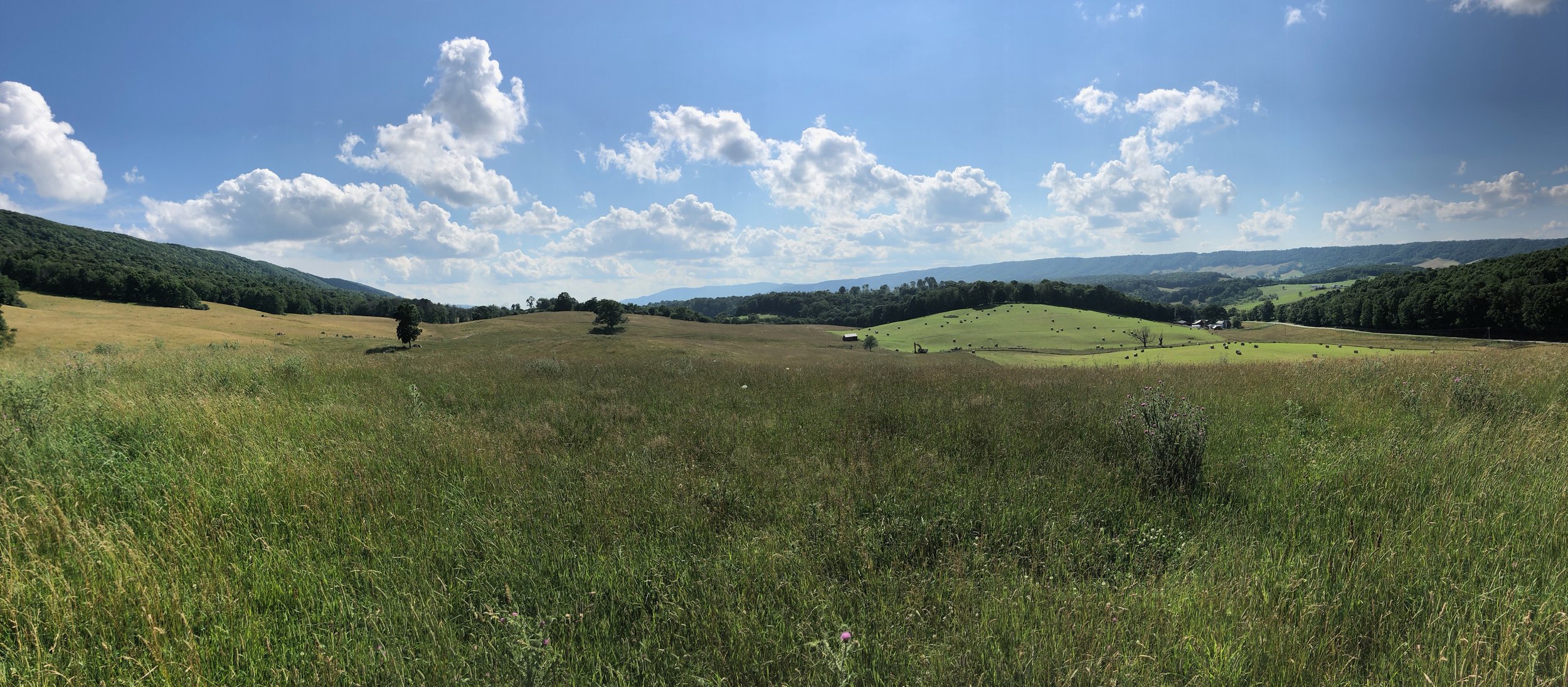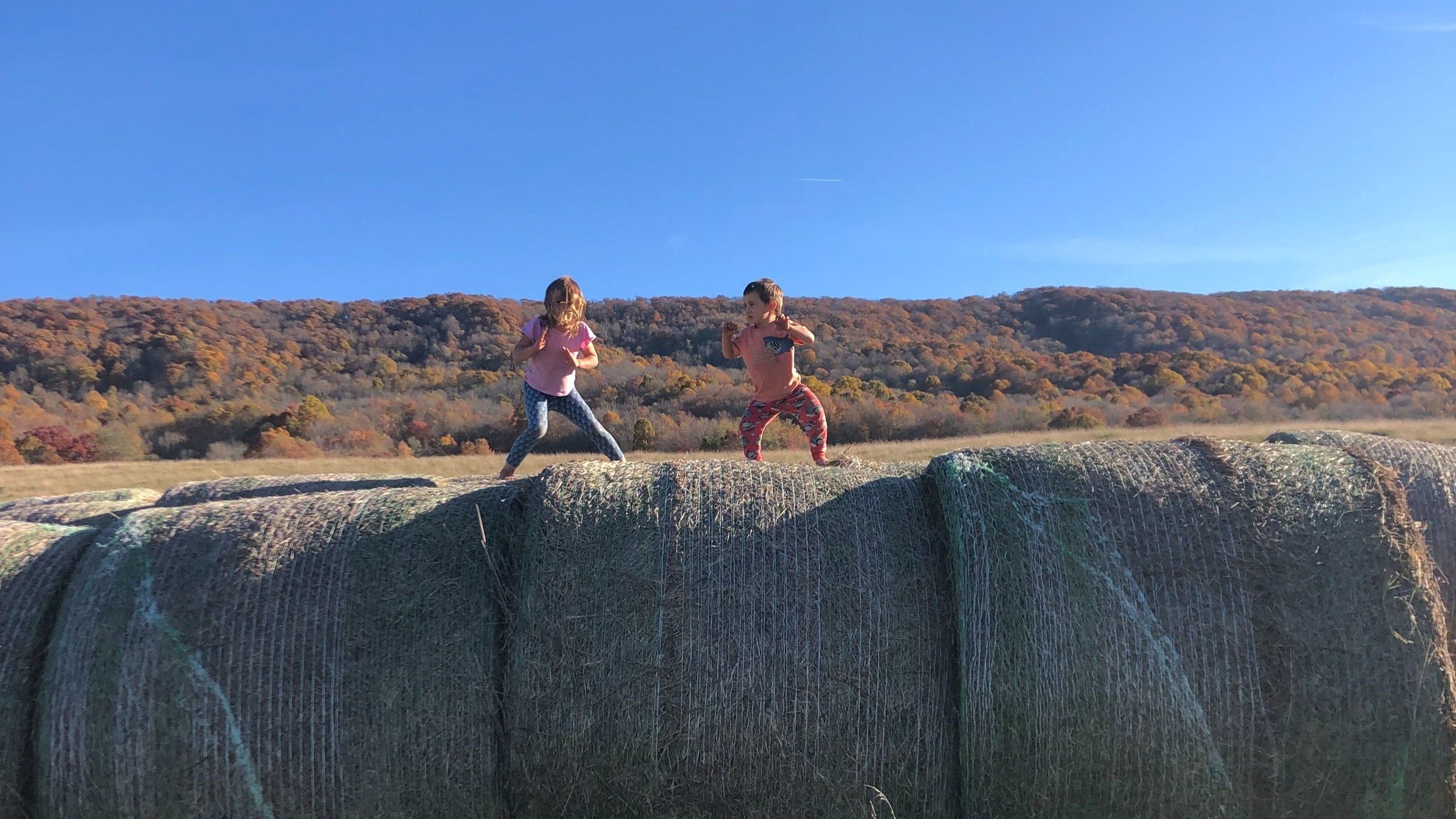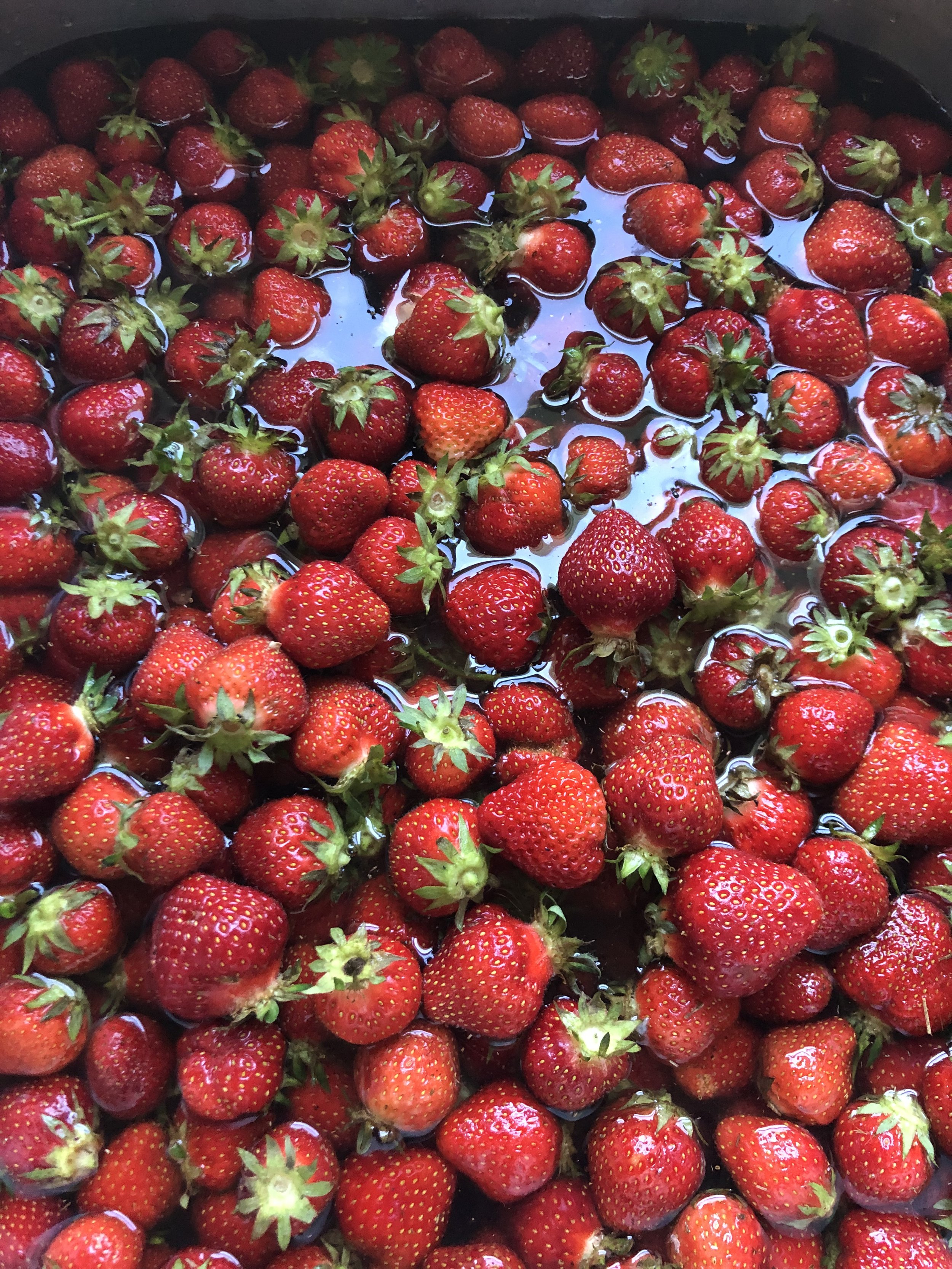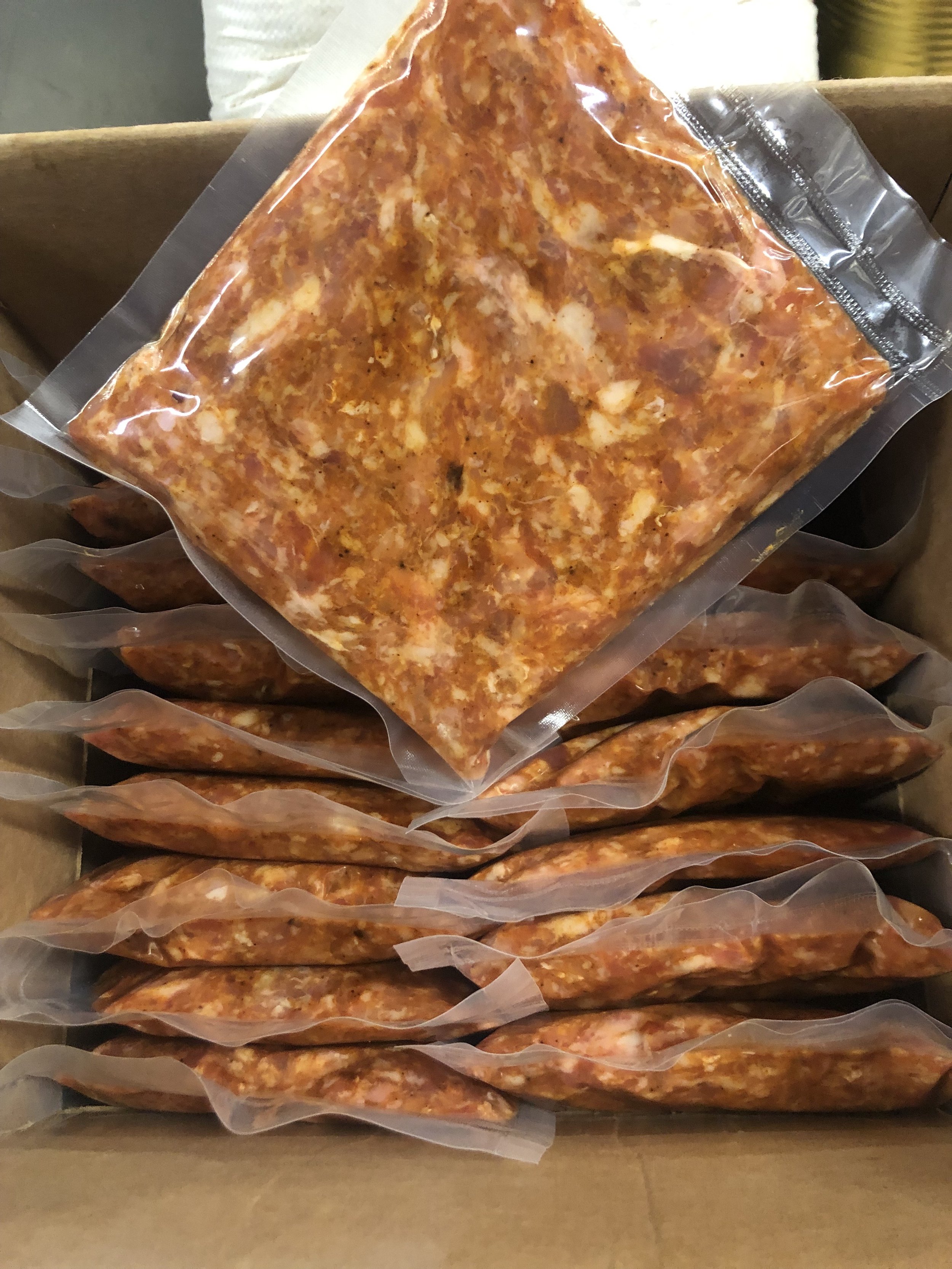
Drug Free Meat, Eggs & Market Garden
Our Small Family Farm Direct To Your Table
South Poll Cattle
Our cattle herd is composed of two South Poll Bulls and roughly 30 cows that we sourced from renowned rancher Greg Judy of Missouri. The South Poll breed was developed by Teddy Gentry (bass player for the band Alabama) in 1989. Gentry combined 4 breeds (1/4 Barzona, 1/4 Senepol, 1/4 Red Angus, and 1/4 Hereford) into what is now known as the “south poll.” The breed is known for their high fertility, docile disposition, slick coat, smaller frame, and an exceptional ability to gain weight on grass forage. South Poll cattle are naturally “polled,” meaning they are born without horn buds and do not develop horns as they age. Mature animals are processed around 1000-1200 lbs live weight and typically around 2 years of age. Mr. Judy sourced his South Poll herd from Mr. Gentry (the breed’s creator) and we sourced our herd from Greg. You simply will not find more beautiful cows anywhere in the country.
Tamworth, Berkshire, and Mulefoot Pigs
We maintain three inter-mixed breeds of heritage pigs (Tamworth, Berkshire, and Mulefoot). Tamworth (red) and Berkshire (black and white) breeds are known for weight gain and docile dispositions, while the Mulefoots (black) are hardy and excellent foragers. The combination is ideal for our forested silvopasture setting that boasts large fall acorn crops and a generous mushroom bloom in the spring. The pigs live in the forest and forage on nuts, tubers, and grass depending on the season. We supplement them with raw A2 milk from our Guernsey cows, fresh produce from the garden, watercress from our mountain spring, and a combination of grains and cracked-corn from a local Virginia farmer.
St. Croix Sheep
Our sheep herd also comes directly from Greg Judy’s Green Pastures farm in Missouri. Greg sourced his sheep stock from a fellow MO farmer who focused his management on parasite resistance. The story goes that the original farmer (who had a similar philosophy as we do regarding pharmaceutical drug interventions) lost some 90% of his original stock to disease. The 10% of hardy, parasite resistant stock that survived, however, were basically “bullet proof” in terms of natural health. It is from this parasite resistant stock that the original farmer rebuilt his herd and from which Greg and thus our own flock originate. St. Croix are “hair” sheep, which means they shed their winter coats (no shearing required) and as such they are much closer to a wild breed than most domesticated “wool” sheep. We raise them exclusively for meat production and “cuteness” around lambing season.
100% New Zealand Kiko Goats
“Kiko” is the Maori word for “meat.” The breed was created in the 1980s by Garrett and Anne Batten (of New Zealand) who crossed local feral goats with three breeds of dairy goat bucks (Anglo-Nubian, Saanen, and Toggenburg). The result was a fast-growing meat breed that was well suited to the mountain grasslands of New Zealand (a climate very similar to the one in which we live and farm in Craig County VA). The goat forefathers of our registered 100% New Zealand Kikos were imported to the United States in the 1990s and their lineage can be traced back to the original imported stock from New Zealand.
About Our Beef
We offer shares starting at 25 lbs (available in all beef or 50% beef and pork mixture). If you are a regular and you give us a heads up, we would be happy to customize your order.
The cuts on the front quarter are different than those on the rear quarter. Some cuts are mutually exclusive. For example, a T-bone steak includes both the NY Strip and the Filet Mignon. You can get 100% T-bones but if you do you can’t get any NY Strip or Filet Mignon (and vice versa). If you’re ordering a half or whole beef, we can work with you to customize your cut sheet. Product is frozen at the butcher shop and will arrive frozen on delivery to your home or pickup location.
Our beef is calved and raised exclusively on our farm without any drugs. We do not vaccinate or medicate, so you are consuming pharmaceutical-free meat.
We also don’t bring in outside animals. Our females (heifers) mature for two years before they are put in with the bulls and then subsequently have their first calves around three years old. The male calves are banded a few days after birth (making them steers). Calves are nursed by their mothers, as well as grazing and foraging as they grow. The steers grow quickly in the first summer and will be fully mature (ready for butcher) by approximately 18 months old. We usually butcher after the animal has had a full season of grazing summer grass (early fall is peak condition for the animal and leads, in our opinion, to the most flavorful and nutritious product as the animal has been dining on fresh green grass for the last 7 months.
Our beef is raised on pasture, dry-aged for 14-21 days and is brought to the butcher shop while it’s young and hitting the end of its growth cycle. This makes for a much more tender cut than most “Grass Fed Grass Finished” steaks you may have bought from the store.
A butchered animal is typically hung in quarters at the butcher shop where it is aged for 14-21 days. The refrigerated aging process tenderizes the meat nicely so that you get the health benefits of a pasture raised animal without sacrificing the tenderness of the finished product. A single 1200 lb steer (live weight) will typically produce approximately 600 lbs “hanging weight” and approximately 350-400 lbs packaged product.
Order a combined beef and pork box
25lb or 50lb boxes available. Combination of beef (steaks, roasts, ground beef) and pork (chops, roasts, sausage).
About Our Pork
Each of our pigs is born on our farm and raised in a silvo-pasture environment. Silvo-pasture (lightly forested) is the ideal setup for pigs to forage on grass, grubs, nuts, fungi and other foods that grow well in this environment).
Pigs are very prolific so the herd is managed differently than cattle. A few choice females (sows) are kept for breeding along with 1 or 2 males (boars). The rest of the males are castrated (making them barrows). As with all of the other animals on our farm, the pigs are raised completely free of pharmaceuticals. No vaccines, no drugs or hormones of any kind - period. This is clean meat raised the old-fashioned way.
Pork is available as sausage, brats, in various cuts, or as a roast. Chorizo is our absolute favorite.
Different cuts include pork chops, Boston Butt, Loins, Shoulder Chop, and Hams. The woman of the house likes bacon so much that we typically don’t sell it, but it is available if you schedule a whole hog processing day with our family.
Maturation rates vary by breed. Younger mulefoot pigs (9-12 months old) are a great choice for a whole-hog roasting pig. Buy one for $5.50/lb hanging weight for a large event or party.
Our Mulefoot pigs take about 16 months to mature to the same weight that a Tamworth or Berkshire will achieve in about 12. For this reason we like to sell the Mulefoots as “roasting hogs” (typically around 100 lbs hanging weight), while the larger Berkshire and Tamworth breeds are typically sent to the butcher shop around 200-300 lbs live weight. By the end of their first year, they are fully mature for their intended purpose.
How We Raise Our Animals
Cattle, sheep, and goats are all ruminants (meaning they principally eat grass). Our sheep, cattle, and goats forage on what grows naturally and organically on our farm, and we supplement that with a “free choice” mineral program. Our chickens and pigs forage in the pasture and forest respectively, and are supplemented with watercress from our spring, veggies from the garden, milk from our Guernsey cows, and a cracked-corn and grain meal mix from a local farmer. That is it.
No GMOs, no vaccines, no antibiotics, no steroids, no dewormer, no shots for pinkeye, etc. Our animals are naturally parasite-resistant, and because we do not poison them with various pharmaceutical concoctions, we have the healthiest meat you can find.
Why Should You Buy Our Meat?
We raise our ruminants (cows, sheep, goats) almost exclusively on pasture. That said, we see nothing wrong in feeding a cow, for example, a little corn and other veggies out of our organic garden in the summer (cows absolutely love corn - stalks, leaves, and seed head - they go nuts for it). An exclusive diet of dried up cracked corn is a different story. This is typical for “industry” beef that is purchased at grocery stores. We think it’s unhealthy for the animal to live in a feedlot where they trade the assortment of vitamins found in fresh rotational pasture for a muddy poop pond in their last months before slaughter. Getting a “marbled steak” and losing out on all that nutrition (and adding a lot of pharmaceutical interventions to your meat due to the unsanitary conditions) is a net negative in our view.
Besides diet, there are other differences that affect the quality and taste of your meat. Those differences include but are not limited to breed, diet, lifestyle, and stresses that animals may or may not be subjected to (like being transported often, raised on “milk substitute” instead of mama’s milk, being bred too early, and so on). A major difference with our animals is that we aim to keep their lives as natural as possible. Our cattle are born on this farm, and the only time they are transported is to the butcher when ready. We let the cows wean their calves on their own timeline. They are all free to roam, graze, build muscle mass naturally, access minerals, and generally live their best lives with very little interference from us.
Buy our meat because 1) we’re a small producer (it’s good for the big guys to have some competition), 2) our beef is dry aged, and sold at a fair price, and 3) because our animals are all drug free and raised on a healthy diet of Virginia pasture from a single farm. Your chances of having an outstanding and healthy steak are a lot better when you hedge your bets in such a way.
What’s In The Garden
Coming soon …
The primary growing season on our farm is March through October. That said, we are working hard to generate produce year round in one of several greenhouses (either completed or under construction). All of our produce is open-pollinated, has ZERO chemical inputs whatsoever (way beyond the organic standards), and many of the seeds are heirloom varieties. Some of our favorite tomatoes come from our neighbor, who (now retired and in his late 60s) has been growing them in Sinking Creek Valley as part of a continuous and unbroken family tradition for more than 100 years. He was generous enough to share them with us and we hope to one day share them with you.
We plant the following crops (available seasonally based on successful growing conditions and heavy on the vegetables as the fruit crops are still at an early stage of development): Artichoke, Asparagus, Basil, Beans, Beets, Blueberries, Broccoli, Brussels Sprouts, Cabbage, Carrots, Corn, Cucumber, Elderberries, Kale, Lettuce, Okra, Peas, Peppers (Bell, Hot, and Sweet), Potatoes, Pumpkins (multiple varieties), Radish, Raspberries, Rhubarb, Spinach, Squash (multiple varieties), Strawberries, Sweet Potatoes, Tomatoes, Watermelon, and Zucchini.
If you want beef or pork these are both available now. Please follow the order buttons above to place an order or make an inquiry. If you are interested in garden produce, eggs, raw milk, pastured broilers (chicken), sheep (available summer 2024), or goats (available summer 2024) then please add yourself to our interest list for the future. When we have enough interest we will consider scaling the garden/egg/milk effort if they are deemed economically feasible. Until then it remains at the family and local neighborhood scale.























